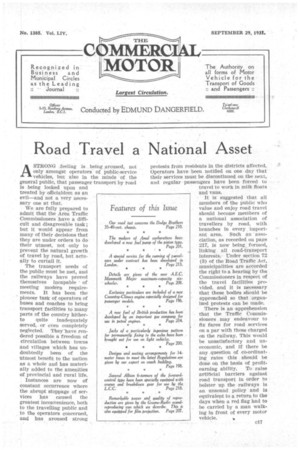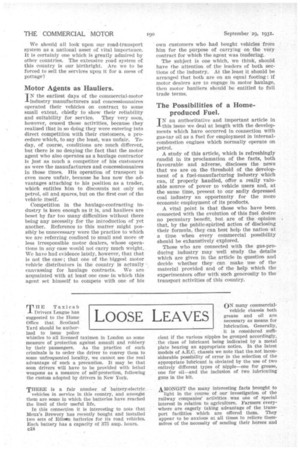Road Travel a National Asset
Page 39

Page 40

If you've noticed an error in this article please click here to report it so we can fix it.
ASTRONG feeling is , being Aroused, not only amongst operators of public-service vehicles, but also in the minds of the general public, that passenger transport by road is being looked upon and treated by officialdom as an evil—and not a very necessary one at that.
We are fully prepared to admit that the Area Traffic Commissioners have a difficult and disagreeable task ; but it would appear from many of their decisions that they are under orders to do• their utmost, not only to prevent the natural growth of travel by road, but actually to curtail it.
The transport needs of the public must be met, and the railways have proved themselves incapable of meeting modern requirements. It has been the pioneer task of operators of buses and coaches to bring transport facilities to many parts of the country hitherto quite inadequately served, or even completely neglected. They-have rendered possible a freedom of circulation between towns and villages which has undoubtedly been of the utmost benefit to the nation as a whole and has materially added to the amenities of provincial and rural life.
Instances are now of constant occurrence where the abrupt stoppage of services has caused the greatest inconvenience, both to the travelling public and to the operators concerned, and has aroused strong protests from residents in the districts affected. Operators have been notified on one day that their services must be discontinued on the nem and regular passengers have been forced to travel to work in milk floats and vans.
• It is suggested that all members of the public who value and enjoy road travel should become members of a national association of travellers by road, with branches in every important area. Such an association, as recorded on page 217, is now being formed, linking all road-transport interests. Under section 72 (3) of the Road Traffic Act, municipalities are accorded the right to a hearing by the Commissioners in respect of the travel facilities pro. vided, and it is necessary that these bodies should be approached so that organized protests can be made.
There is an apprehension that the Traffic Commissioners . may endeavour to fix fares for road, services on a par with those charged on the railway. This would be unsatisfactory and uneconomic, and if there be any .question of co-ordinating rates this should be done on the basis of profit earning ability. To raise artificial barriers against road transport in order to bolster up the railways is an unsound policy and iS equivalent to a return to the days when a red flag had to be carried by a man walking in front of every motor vehicle. We should all look upon our road-transport system as a national asset of vital importance. It is certainly one which is greatly admired by other countries. The extensive road system of this country is our birthright. Are we to be forced to sell the services upon it for a mess of pottage?
Motor Agents as Hauliers.
TN the earliest days of the commercial-motor -1-industry manufacturers and concessionnaires operated their vehicles on contract to some small extent, chiefly to show their reliability and suitability for service. They very soon, however, ceased those activities, because they realized that in so doing they were entering into direct competition with their customers, a procedure which, to say the least, was unfair. Today, of course, conditions are much different, but there is no denying the fact that the motor agent who also operates as a haulage contractor is just as much a competitor of his customers as were the manufacturers and concessionnaires In those times. His operation of transport is even more unfair, because he has now the advantages attaching to his position as a trader, which entitles him to discounts not only on petrol, oil and spares, but on the first cost of the vehicle itself.
Competition in the haulage-contracting industry is keen enough as it is, and hauliers are beset by far too many difficulties without there being any necessity for the introduction of yet another. Reference to this matter might possibly be unnecessary were the practice to which we are referring confined to small and more or less irresponsible motor dealers, whose operations in any case would not carry much weight. We have had evidence lately, however, that that is not the case; that one of the biggest motor vehicle distributors in the country IA actually canvassing for haulage contracts. We are acquainted with at least one case in which this agent set himself to compete with one of his own customers who had bought vehicles from him for the purpose of carrying on the very contract for which the agent was tendering.
The subject is one which, we think, should have the attention of the leaders of both, sections of the industry. At the least it should be arranged that both are on an equal footing: if motor dealers are to engage in motor haulage, then motor hauliers should be entitled to full trade terms.
The Possibilities of a Homeproduced Fuel.
TN an authoritative and important article in -II-this issue we deal at length with the developments which have occurred in connection with gas-tar oil as a fuel for employment in internalcombustion engines which normally operate on petrol.
A study of this article, which is refreshingly candid in its proclamation of the facts, both favourable and adverse, discloses the news that we are on the threshold of the development of a fuel-manufacturing industry which can, if properly handled, offer a really valuable source of power to vehicle users and, at the same time, present to our sadly depressed coal industry an opportunity for the more economic employment of its products.
A vital point is that those who have been connected with the evolution of this fuel desire no pecuniary benefit, but are of the opinion that, by the public-spirited action of disclosing their formula, they can best help the nation at a time when every commercial possibility should be exhaustively explored.
Those who are connected with the gas-producing industry may well study the details which are given in the article in question and decide whether they can make use of the material provided and of the help which the experimenters offer with such generosity to the transport activities of this country.












































































































